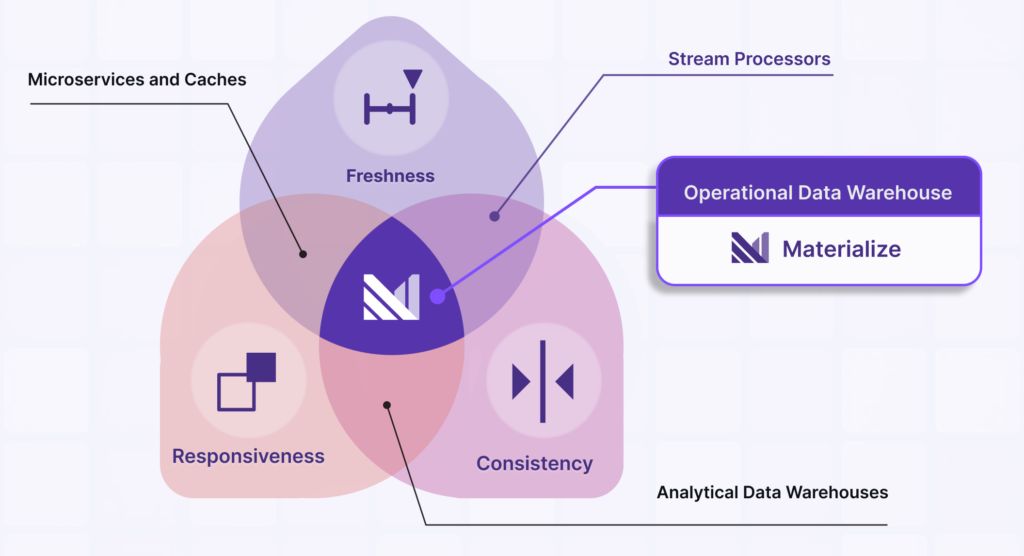
Operational Data Warehouse: Power Real-Time Business Processes

Have you ever tried driving real-time updates to customer-facing applications? Or optimized a conversion funnel using streaming data? If so, you’ve probably suffered the pain of pushing your data warehouse past its limits.
Fortunately, there’s an alternative. This blog gives an overview of the operational data warehouse, how it works, and why it delivers better cost/performance for near-real-time use cases.
Analytical Data Warehouse — The Traditional Option
Analytical data warehouses run on batch processing — data is updated every few hours in batches, and queries are run on set intervals.
This is great for historical analytics and other use cases that do not require frequent data transformation. But the analytical data warehouse lacks features required for real-time use cases.
It’s not always up to date. It’s not always immediately responsive. Its contents are not always consistent. In other words, the analytical data warehouse wasn’t designed for real-time use cases.
That’s where an operational data warehouse comes in.
Operational Data Warehouse — Real-Time Use Cases
Operational data warehouses combine streaming, real-time data with continuous data transformation to power essential business processes.
From dynamic pricing, to financial modeling, to customer-facing apps, operational data warehouses enable the mission-critical workflows that businesses rely on.
To power real-time use cases, operational data warehouses must continuously transform streams of raw data into actionable outputs. By harnessing real-time data, ODWs process data in a continuous, incremental way, as opposed to in scheduled batches.
Most streaming data services do not offer SQL support. With operational data warehouses, you can harness SQL to interact with streaming data. ODWs offer the best of both worlds: SQL plus streaming data.
Operational data warehouses leverage incrementally maintained views to decouple the cost of compute and data freshness. This provides up-to-date query outputs at a fraction of the cost. Materialized views refresh and store the results of a query, so you don’t need to recompute the query constantly.
Operational Data Warehouses: Key Use Cases
Operational data warehouses serve a broad set of use cases across different sectors, including financial services, e-commerce, manufacturing, and more. ODWs are best positioned for use cases that:
- Benefit from fresh data
- Need a consistent, push-based system
- Require always-on warehouse compute, running a predictable workload
- Run into limits or complexity with dbt incremental materializations
Specific use cases that ODWs handle vary, but most require real-time data and continuous data transformation. These include:
- Fraud detection
- Real-time analytics
- Automation and alerting
- Segmentation and personalization
Operational data warehouses are ideal for use cases that need constant query computation without high costs.
Materialize: Built on Trust, Scale, and Ease
As we built Materialize as an operational data warehouse, we focused on three foundational elements: trust, scale, and ease. Materialize views trust as a combination of interactivity, freshness, and consistency.
Materialize must be responsive, minimizing the time between an operational task and its completion. It must be up to date, immediately reflecting updates to your data as soon as they happen. It must be consistent, presenting answers and taking actions that always check out.
These properties combine to make Materialize a trusted surrogate data operator. Materialize scales in multiple independent and important dimensions.
It scales up within a use case through a data-parallel data processor that can involve multiple cores and computers.
It scales out across arbitrarily many use cases through storage and compute isolation. It even scales down to a single core if that is all your use case needs.
This flexibility means Materialize can absorb all shapes of work, but only spends in proportion to their requirements. Materialize is as easy as a strictly serializable SQL database.
However, the value of Materialize is that you get to benefit from this streaming technology without needing to deeply understand it.
Streaming is just an implementation detail, rather than the product category. Materialize presents as a trustworthy, scalable, and easy-to-use data warehouse that just happens to be adept at operational work.
Operational Data Warehouse: Move Your Business to Real-Time
Operational data warehouses marry streaming data with continuous SQL transformations to fuel critical business processes. With ODWs such as Materialize, you can power real-time use cases, and perform operational work.
To learn more about operational data warehouses, read our white paper: Building an Operational Data Warehouse for Real-Time Analytics.




























